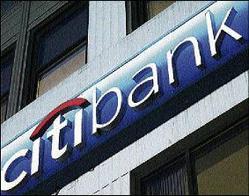
The Citibank logo is shown on a branch office in this April 11, 2007 file photo in New York. Citigroup is forecast to write-down another US$18 billion in the first quarter. - AP
NEW YORK (AP):
Citigroup shares sank to their lowest level in more than nine years Tuesday, as stockholders recoiled at forecasts of more losses at the troubled bank and comments from a Middle East fund executive that Citi must raise more cash to stay in business.
Samir al-Ansari, chief executive of the US$13 billion (euro8.55 billion) government-owned investment firm Dubai International Capital, said Tuesday at a private equity conference that it will take more than the combined efforts of the Gulf's wealthiest investors - the Abu Dhabi Investment Authority, the Kuwait Investment Authority and Saudi Prince Alwaleed bin Talal - to save Citigroup.
Back in January, Citi raised US$12.5 billion (euro8.22 billion) from a group of investors including the Kuwait Investment Authority, the Government of Singapore Investment Corp and Prince Alwaleed.
And last year, Citi nabbed US$7.6 billion (euro5 billion) from the Abu Dhabi Investment Authority, a sovereign wealth fund owned by the ruling elite of the United Arab Emirates, the world's fourth-largest oil exporter, in return for a 4.9 per cent stake.
But a person familiar with Citigroup, who spoke on condition of anonymity because of the private nature of capital-raising efforts, said the bank is not actively seeking more cash from sovereign wealth funds.
The person said demand for Citi stock had been significantly higher, but the bank decided the US$12.5 billion (euro8.22 billion) was enough.
The reason many shareholders are selling off is that Citi is poised to suffer additional losses due to defaulting loans.
More debt write-downs
Having already written down US$18 billion (euro11.84 billion) in bad mortgage-related debt in the fourth quarter, Merrill Lynch analysts predicted that Citi will have to write down another US$18 billion (euro11.84 billion) in mortgage and other debt in the first quarter, according to Dow Jones Newswires.
Meanwhile, Goldman Sachs analysts issued a note saying a modeling miscalculation led it to overestimate its profit forecast for Citi.
Goldman on Tuesday lowered its prediction of a first-quarter profit at Citi of 15 cents a share to a first-quarter loss of a US$1 (euro.66) a share.
It also reduced its 2008 full-year profit estimate to US$1.35 (euro.89) a share from US$2.50 (euro1.64) a share.
Citigroup shares - which have shed about 50 per cent since the credit markets froze up last summer - dropped another 5.6 per cent to US$21.80 (euro14.34) in early afternoon trading Tuesday on the New York Stock Exchange.
In January, Citigroup reported losses of almost US$10 billion (euro6.58 billion) in the fourth quarter, spurred by US$18 billion (euro11.84 billion) in write-downs.
In addition to capital injections from sovereign wealth funds, the bank has been raising cash through small asset sales of nonessential assets and nearly halving its dividend in January.
"Not only do they need to raise more money, but they should've suspended their dividend six months ago," said Christopher Whalen, managing director of consulting firm Institutional Risk Analytics. "They're trying to do this in bite-size pieces. But everyone's still waiting for the other shoe to drop."
Citi Chief Financial Officer Gary Crittenden said in January the US$12.5 billion (euro8.22 billion) stake, along with a US$2 billion (euro1.32 billion) stock sale the bank completed soon afterward, was enough to address "potential capital shortfall under multiple scenarios."
"They're saying it's enough _ it's not enough," Whalen said, noting that further losses from consumer debt will draw down Citi's cash levels.
Citi executives pointed in January to the bank's Tier 1 capital ratio _ essentially, its ratio of cash to debt _ which lifted from just above 7.0 per cent to 8.8 per cent.
The Federal Deposit Insurance Corp says that for a bank to be considered well-capitalised, its Tier 1 capital ratio must be above 6.0 per cent.
Dubai International Capital is an investment firm controlled by Dubai's ruler Sheik Mohammed bin Rashid al Maktoum.
It already owns stakes in HSBC Holdings PLC and Standard Chartered PLC, but not in Citi.

